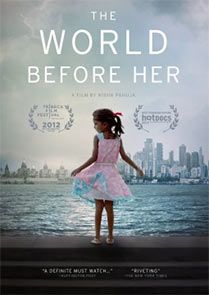 The World Before Her is a remarkable film, if for no other reason than that it tells the story of India's women centred on them alone.
The World Before Her is a remarkable film, if for no other reason than that it tells the story of India's women centred on them alone.
In a video that began circulating online in the aftermath of the controversy surrounding Human Resource Development Minister Smriti Irani's educational qualifications, she is addressing a group of female politicians from around the world.
It is February 2014.
Ms Irani recounts the story of a woman who had been asked by her husband to kill their third daughter. The woman, in the winter that is December in Punjab, put the baby out in the cold without a piece of cloth on her body. In the morning, the baby was blue but alive.
Ms Irani's speech is one of those rare moments when our brains, addled by a surfeit of information, are able to shake off the pervasiveness of the multiple stimuli bombarded in our directions. I was completely hooked on her every word and waited, with a growing sense of dread, for the denouement. It was positive, suffice to say, and the speech seemed to make good what its uploader had sought to achieve, saying: "Haan bhai, ab batao kis kis ko degree dekhni hai?" ("Now tell me, who wants to look at her degree?").
It cannot but be a coincidence, though, that Ms Irani's speech circulated online in a week that saw the India release of Nisha Pahuja's film The World Before Her. Ms Irani seems to have straddled the two worlds showcased in the film, which contrasts -- but also juxtaposes -- the lives of Miss India contestants with those of girls who attend the training camps of the Durga Vahini, the women's wing of the Vishva Hindu Parishad.
Ms Irani herself is a former Miss India contestant who rose to become a Cabinet minister in the Bharatiya Janata Party government.
There is Ruhi, a Jaipur girl, who is fighting tooth and nail for the Miss India crown.
Then there is Prachi, a Durga Vahini camp attendee from early childhood.
On the surface, they are as different as their backgrounds and chosen life paths suggest. But dig deeper, which Ms Pahuja does brilliantly by way of interviews, and the similarity of their ambitions -- their thirst for designing their own selves -- reveals itself.
The World Before Her negates generalisations. Prachi is a dyed-in-the-wool Hindu nationalist who rattles off cliches about Muslims at the drop of a hat. At the same time, she is a sensitive soul, who, in a shocking scene, tells the camera that she is forever grateful to her father because he let her live, "even though I am a girl".
The woman in Ms Irani's story could have been Miss India Pooja Chopra's mother, who walked out on her husband when he demanded that she get rid of Pooja, a second female child. Even as the mother speaks into the camera 23 years after the incident, her tears flow freely as she basks in the coming-to-fruition of the challenge she threw at her husband all those years ago: "This girl, because of whom you are leaving me, will make me proud one day."
The World Before Her is a remarkable film, if for no other reason than that it tells the story of India's women centred on them alone. This might seem obvious, but the truth is that if you are looking for cultural pointers that capture the status of Indian women, you hear everyone but them.
On STAR Plus, for example, a prime-time show called Ek Hasina Thi tracks a woman's struggle to get justice for her friend who was raped by the son of a major Kolkata tycoon.
If the aim of the show was to spread awareness, the script ensures that this becomes the least of its hallowed goals. One is befuddled by Shourya Goenka's (the rapist) confidence in himself. Where is the story? Is the arc supposed to mete out justice after a sufficient build-up? If so, we must ask if we need such build-ups.
We live in a country where rape is an everyday reality for several women. Do we want our storytellers to show us the full extent of the rapists' vileness -- abuse of power, corruption, influence peddling, etc -- before the show's purported aim, justice, is achieved? Aren't we in danger of deriving the crux of the story not from the sad, vicious, deplorable effects of rape, but from the depredations of the perpetrators?
The level of sensationalism and the need for dramatic continuity force the viewer into a sort of shocked silence, where anything goes in the hope that justice might arrive one day. What this does for the conversation that we need to have as a society about violence against women is anybody's guess.
Against this backdrop, it is a pleasure to watch The World Before Her.











